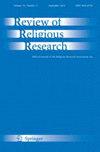Chinese Exceptionalism? Folk Religions and Subjective Well-being
IF 1.5
1区 哲学
0 RELIGION
引用次数: 0
Abstract
Folk religions are reviving in contemporary China. They are distinctive from institutionalized religions and share many qualities with the emerging religious phenomena in the West. Despite their significance, however, the lack of concise frameworks and causal analysis methods has hindered a deeper understanding of these religions. By integrating psychological and sociocultural perspectives, this study concentrates on subjective well-being and tailors a micro model applicable to analyzing Chinese folk religions, along with a novel instrumental variable for causal identification. Empirical evidence suggests that folk religions have negative effects on subjective well-being, resulting in a 17.3 percent decrease in subjective well-being compared to the sample mean. This is primarily due to believers seeing folk religions as mere means for achieving earthly targets, therefore suffering from strengthened negative senses and motivated radical behaviors. Nevertheless, investing in folk religions to a high degree might transform believers’ attitudes from seeing folk religions as means to seeing them as ends, thereby alleviating the negativity. This alleviation is mainly derived from positive senses, self-regulation, and inclusive attitudes towards society. Hence, taking religions more seriously and not utilitarianly, or fulfilling unmet targets more effectively, are two paths to eliminate the negative effects.中国例外论?民间宗教与主观幸福感
民间宗教正在当代中国复兴。它们有别于制度化宗教,与西方新兴宗教现象有许多共同之处。然而,尽管它们意义重大,但由于缺乏简明的框架和因果分析方法,阻碍了对这些宗教的深入了解。通过整合心理学和社会文化视角,本研究聚焦于主观幸福感,并定制了一个适用于分析中国民间宗教的微观模型,以及一个用于因果识别的新型工具变量。经验证据表明,民间宗教对主观幸福感有负面影响,导致主观幸福感与样本平均值相比下降了 17.3%。这主要是由于信徒将民间宗教仅仅视为实现世俗目标的手段,因此负面意识增强,激起了偏激行为。然而,对民间宗教的高度投入可能会转变信徒的态度,从把民间宗教视为手段转变为把民间宗教视为目的,从而缓解消极情绪。这种缓解主要来自于积极的感觉、自我调节和对社会的包容态度。因此,更认真而非功利地对待宗教,或更有效地实现未达到的目标,是消除负面影响的两条路径。
本文章由计算机程序翻译,如有差异,请以英文原文为准。
求助全文
约1分钟内获得全文
求助全文
来源期刊

Review of Religious Research
Multiple-
CiteScore
2.50
自引率
20.00%
发文量
31
期刊介绍:
The Review of Religious Research (RRR) publishes empirical social science research on religion, primarily in sociology and social psychology and related fields of psychology, and scholarly literature reviews of research in these fields. RRR provides a forum for research across multiple disciplines and approaches, including research on the following topical areas: Clergy; Church programs; Comparative analyses of religious denominations and institutions; Denominational and congregational growth, decline, and vitality; Denominational and congregational conflict, competition, and cooperation; Ethnicity/race and religion; Generational and personal religious change; New religious movements; Personal spiritual and religious beliefs and practices; Religion and attitudes; Religion and family; Religion and gender, Religion and social behavior; Religion and well-being; and Research methodology. Among the characteristics that distinguish RRR from other academic journals on the study of religion are its applied focus and the opportunities it offers for academics and denomination-based researchers to share their findings with each other. RRR aims to facilitate the sharing and comparing of applied studies between denominational and academic researchers. RRR is the official quarterly journal of the Religious Research Association, Inc. RRR regularly publishes Original Articles, Research Notes, Review Articles, Applied Research Abstracts, and Book Reviews, and occasionally publishes articles on the Context of Religious Research. Applied Research Abstracts: This type of publication (previously called Denominational Research Reports) consists of a 350-550 word summary (without any references) of an applied research study in the form of a structured abstract, with the following section headings: Background, Purpose, Methods, Results, and Conclusions and Implications, followed by 3-4 keywords. The author may included a footnote that states: (a) whether a complete report exists and how it can be obtained; (b) whether the raw data are available in electronic form and how they can be obtained if the authors wish to make them available to other researchers; and (c) whether the authors would like to collaborate with other researchers to further analyze the data and write a full report for possible journal publication as a peer-reviewed manuscript. Such abstracts should be submitted to the journal editor for consideration for publication. Book Reviews: Unsolicited book reviews are not accepted for publication in RRR. If you would like to review a book for the journal, contact the Book Review Editor, David Eagle, Ph.D. – david.eagle@duke.edu Context of Religious Research: This journal heading covers items about awards and announcements, memoriams, and articles about the research process (e.g., articles on research methods and statistics, and profiles of denominational research organizations), as well as invited addresses to the Religious Research Association. Unsolicited articles should be submitted to the journal editor for consideration for publication. Original Articles: These are scholarly and methodologically sophisticated research studies: see Information for Authors on this website and the Submission Guidelines on the Springer RRR website for details (https://www.springer.com/13644) Reseach Notes: These are scholarly and methodologically sophisticated research studies: see Information for Authors on this website and the Submission Guidelines on the Springer RRR website for details (https://www.springer.com/13644) Review Articles: Authors should send an email to the journal’s editor describing the nature and scope of a proposed literature review to see if it is suitable for publication in RRR. See Information for Authors on this website and the Submission Guidelines on the Springer RRR website for details (https://www.springer.com/13644) The journal’s editor is Kevin J. Flannelly, Ph.D. – kjflannelly@gmail.com
 求助内容:
求助内容: 应助结果提醒方式:
应助结果提醒方式:


